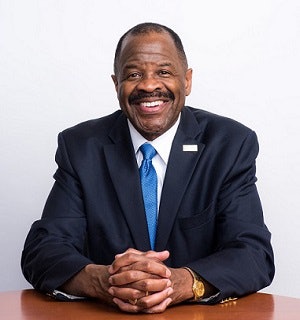As he discusses experiences in his life that contributed to his success as a legal scholar and dean of the George Washington University Law School, Blake D. Morant doesn’t mention receiving awards and degrees, or even being appointed to two distinguished deanships. Instead, he immediately recalls his years as an Eagle Scout and his upbringing by a mother who encouraged him to develop all of his talents to take advantage of opportunities for advancement.
 Blake D. Morant
Blake D. MorantScouting, he says, was part of the “holistic education” his mother believed in, and which he promotes in his writing as a solution to many of the problems facing society today. That, and his military service as a JAG officer at Ft. Bragg, enabled him to “learn from people who had different experiences and upbringing than I.”
Morant served as dean of the Wake Forest University School of Law for seven years before becoming dean of GW Law in 2014. Morant, whose full title is Dean and the Robert Kramer Research Professor of Law, is himself a symbol of leadership diversity as the first African-American to hold the position.
“Diversity has always been a linchpin in my career,” he tells Diverse. “It is one of the core values that’s a huge part of my career.”
In his “Message from the Dean” to prospective students on the GW Law website, Morant stresses the importance of inclusion to the institution. “Society’s continued globalization compels the quest for diversity, which to many constitutes the ‘Holy Grail’ of legal education,” Morant states in the message. “It goes hand-in-hand with quality legal education, and its achievement addresses the needs of an increasingly complex society.”
Morant has published scholarly literature in areas including contract theory, media law and administrative law. He also has served as president of the Association of American Law Schools (AALS).
He also writes for popular publications on subjects such as civil discourse, which, he suggests, is fading from today’s landscape of public debate. In a May 2018 article in The Atlantic, Morant recalled a panel discussion he participated in a month before the 2016 election when an audience member confronted him “loudly and angrily.” Discussing the incident with Diverse, Morant says that despite his efforts to engage the man in calm conversation, it was clear that the individual wasn’t interested in respectful discourse. Often, Morant says, the lack of civility results from “cathartic speech or venting.”
“If you are truly trying to persuade people, being vested in civility is an important ingredient in that,” he adds, “because you’re not going to get anybody to listen to you unless you are able to give your thoughts in a measured and respectful way and you’re willing to listen to the other person.”
He notes that such exchanges are not uncommon these days, “at a time in time in this country when we have so many fissures,” but he also says the uncivil discussions tend to attract more media attention.
“The problem…is we haven’t had a very good conversation about how to engage each other when we do have those divisions,” he says.
Morant also has insightful views on racial issues. He lived in Charlottesville, Va., for seven years while earning his bachelor’s and law degrees at the University of Virginia. In the wake of the August 2017 violent protests, Morant wrote a blog for the Huffington Post putting forth “The Case for Holistic Education in the Wake of Charlottesville Violence.” Morant explained in the article that “those who foster holistic education recognize that knowledge comes from the study of doctrine in a diverse, inclusive environment that is reflective of 21st century society.”
It is the kind of experiential learning that he witnessed in his youth.
“My mom was so ahead of her time,” he tells Diverse. “She wanted me to interact with and learn from as many people as possible.”
That influence led to his becoming an Eagle Scout and being selected at age 14 to represent Virginia at a World Jamboree in Idaho, which exposed him to even broader opportunities. He also says his involvement in ROTC was a part of that wide-ranging education because it provided a scholarship that paid for his undergraduate studies and let to his military appointments.
Morant says several colleagues and friends have been crucial to his success, including the late Maya Angelou at Wake Forest, where she was a humanities professor, and Robert Scott, professor of law at Columbia University.
As dean of two of the nation’s top law schools, Morant has acquired a wealth of experience in academic administration. In 2009, during his deanship at Wake Forest Law, Morant wrote “Reflections of a Novice: Four Tenets for a New Dean” in the University of Toledo Law Review.
“In my view, a successful dean possesses a keen sense of self,” he wrote. “In other words, effective deaning requires acute self-awareness.” He further suggested that deans should be “continually reflective” and appreciate the personal strengths and weaknesses that they bring to the job.
And in another homage to his main mentor, he adds, “Self-examination comes somewhat naturally to me due to an upbringing by a strong matriarch who stressed the importance of self-awareness.”
This article appeared in the July 12 issue of Diverse. It is one in a series of stories about law school deans.





















